|
The Future of
DADT:
A Conference on the Way Forward
Washington DC; November 17, 2010
Georgetown University Law
Center
Reporting by
Patrick English
US Army
Veteran |

“The
Constitutional system for civilian control over the
military is broken.”
The opening
remarks of Diane Mazur, Professor of Law at the
University of Florida and former Air Force officer,
captured her audience’s attention at The Future of DADT
conference at Georgetown Law. Mazur, a member of the
first of three panels that would discuss the way forward
on “Don’t Ask, Don’t Tell,” backed her claim with a
brief history lesson: the Supreme Court case Rostker
v. Goldberg. During the Soviet invasion of
Afghanistan, then President Carter wanted to extend the
newly re-created selective service system to include
women. He expressed these wishes to Congress, yet
Congress passed a law that applied to men only.
The law was
challenged, ascending to the Supreme Court. The high
Court defended the law, and Congress’ power to trump the
President in military matters, despite his role as
Commander in Chief. The Supreme Court “picked
Congressional wishes over the wishes of the President”
in an arbitrary and unconstitutional manner, Mazur
argued. “Thirty years later Rostker is still
used, and the effect is an unconstitutional
understanding of equality in the military.”
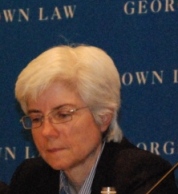 |
Mazur’s history
lesson contained echoes of the current
situation for another law passed by
Congress, Section 654, Title 10 of the US
Code, the statute commonly known as “Don’t
Ask, Don’t Tell.” At a time when this law is
being challenged by the President, many
members in Congress, and in US Federal
Courts, Georgetown Law provided the perfect
forum in which to address how the future of
DADT may look in months or years to come.
The conference exhaustively addressed
current efforts to modify, challenge, and
repeal the law, describing an
Administrative, Judicial, and Legislative
Path. |
The
Administrative Path panel began with an explanation
about “tweaks” that the White House and Pentagon have
made recently to DADT, to make enforcement of the law
more humane. Aaron Tax, Legal Director of
Servicemember’s Legal Defense Network (SLDN), drew
attention to three changes the Department of Defense
made on March 25th of this year. First, DOD
raised the level of officer that can initiate an inquiry
to O-5, conduct an inquiry to O-7, and approve of
separation to Admiral or General. (In October the final
approval of discharge was increased further to the level
of service Secretary.) This “mucks up the system,” Tax
explained, ensuring that the ultimate decision for
discharge would be seen at the highest levels, and
possibly lead to a decline in overall discharges.
The second
change implemented was to tighten up the requirement for
“credible information from a reliable source,” when
initiating an investigation or discharge proceedings
against a service member suspected of being gay. This
means that statements used to discharge someone must now
be made under oath, and can no longer be made by
individuals who are viewed to have a motive of revenge
or history of conflict with the soldier, sailor, airman,
marine, or coastguardsman. The goal is to eliminate
hearsay, blackmail, or the ability of individuals to
force those they don’t like out of the military using
DADT as tool to destroy their lives.
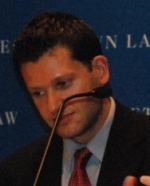 |
The final change implemented protects
service members when they give statements to
lawyers, clergy, public health
professionals, or in cases of sex-same
domestic violence disputes. In the past,
little confidentiality in these matters
applied to military personnel, and many were
forced to choose between their military
career and having a healthy private life.
Despite these positive changes, the effects
of the law would not disappear entirely.
“Even if discharges go to zero, [DADT] still
has a tremendous impact on the 66,000
currently serving LGBT service members,” Tax
cautioned. |
There are
further administrative changes that could be made to
“Don’t Ask, Don’t Tell,” if repeal does not occur soon,
noted Professor Jackie Gardina of Vermont Law, wrapping
up the Administrative panel discussion. Those discharged
under DADT currently receive only half of their
separation pay than if they were discharged under
different circumstances. This standard is only guided by
DOD policy, not the law or regulations pursuant to DADT.
Providing service members full separation pay would be a
good faith effort to minimize the negative impact of the
law.
 |
Gardina further
argued that pre-service statements regarding
sexual orientation should not be used to
initiate an inquiry, and that criminal
proceedings and investigations should have
the same protection of confidentiality that
is now offered under security interviews. If
a service member’s sexual orientation comes
out during a trial, it should not be used
against them. Finally, Gardina offers that
an administrative change could be made that
would only discharge personnel whose
“continued service would create an
unacceptable risk to high order, discipline,
and unit cohesion.” |
Mazur ended
the panel’s discussion with an answer to an audience
question of the possibility of President Obama
suspending discharges under DADT by executive order.
What might stop the next President from reversing the
order? “Reality,” Mazur responded. “It’s a one-way
ratcheting situation.”
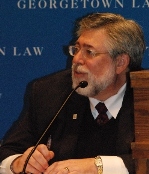 |
Jon Davidson,
moderator of the Judicial Path panel and
Legal Director of Lambda Legal, opened his
panel’s discussion with a brief history of
the legal challenges to a ban on gays in the
military. Beginning with Leonard Matlovich,
who settled with the Air Force after winning
reinstatement to the service in 1980, he
noted that the current law faced “a series
of legal challenges which lost.” |
|
But
the Supreme Court decision in Lawrence v.
Texas, which decriminalized sodomy, changed
the playing field. The “fourth generation” of
cases against DADT were born, achieving results
because “Lawrence changed everything, [it] did
not use traditional language, and so left
interpretative options,” Aaron H. Caplan,
Professor at Loyola Law School, explained.
|
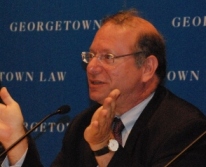 |
Three current
cases were explored in detail by the counsel
representing them. Daniel J. Woods, of the Log Cabin
Republicans v. United States of America, Caplan, of
Witt v. United States Air Force, and Seth
Galanter of Fehrenbach v. Department of the Air Force
et al, were members of the panel who described the
impact their cases have had on DADT.
Perhaps the
case that has had the most impact on how challenges to
DADT are mounted was that of Major Margaret Witt. Witt
was an Air Force Reserve nurse in Washington state,
until an email surfaced at the Pentagon from a woman who
claimed Witt was a lesbian. Witt was investigated and
declined to make a statement. However, the Air Force
interviewed a former partner of Witt’s, and based on the
statements from the partner, proceeded with the
discharge. Witt, being close to retirement from the Air
Force and in danger of losing those benefits, challenged
her discharge in court.
Judge
Leighton of the 9th Circuit ruled in
September that the “government must show that
discharging [personnel under DADT] is in line with their
own interests,” and could not, explained Caplan. Witt
won her case, which is now in appeal, and the ruling
gave rise to the “Witt Standard,” where the government
must prove that the service member negatively impacts
unit order, morale, and discipline in order to be
discharge them.
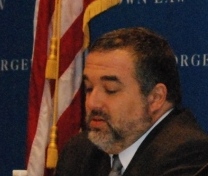 |
The “Witt
Standard” was used to build the two other cases
discussed by the panel. In the case of Victor Fehrenbach,
a highly decorated combat veteran and fighter pilot,
false allegations of sexual assault prompted him to make
statements leading to an investigation and pending
discharge. Inspired by Witt’s case, he mounted a legal
challenge and again, the government failed to show that
his discharge was necessary to protect unit cohesion.
Galanter, in representing Fehrenbach, put it plainly:
“The federal government must follow their
own rules, and they failed to do that.” |
|
The Log Cabin
Republican case, six years in the making, successfully
applied the “Witt Standard,” leading Judge Virginia
Phillips to ultimately declare DADT unconstitutional,
and enact a worldwide injunction against it. While a
temporary stay was eventually granted, Woods explained,
“for one week ‘Don’t Ask, Don’t Tell’ was no longer the
law of the land.”
|
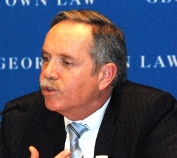 |
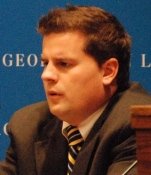 |
The last
panel of the conference, titled “The Legislative Path,”
brought together activists from former and current
organizations that are actively seeking repeal of the
law through Congress. Jeremy Wilson-Simerman,
Legislative Manager at SLDN, summed up the current
situation in Congress. This past Spring, the House of
Representatives amended the National Defense
Authorization Act (NDAA) to include language repealing
DADT. The same day, the Senate voted their version of
the NDAA out of committee with the exact same repeal
language included. Now the focus is on the Senate to
pass the bill with repeal language included. |
“Our primary
goal is to not have a repeat of September,” said Jarrod
Chlapowski of Servicemembers United, referring to an
attempt for the Senate to bring the bill up for a vote,
only to fall short of the votes needed to allow debate
to begin. “Typically, you wouldn’t need cloture to start
debate,” explained David Stacy of the Human Rights
Campaign. The vote was “very close, and a different
procedural environment will bring a chance for a win.”
Stacy saw hope, along with many of the other panelists,
that the “lame-duck” session of Congress will pass the
NDAA, leading to repeal of DADT. A year-long working
group report on the implementation of repeal is expected
from the Pentagon on November 30th.
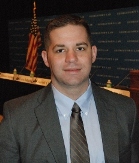 |
Jarrod
Chlapowski
David Stacy
|
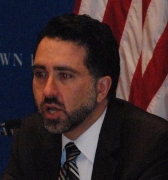 |
However,
Danny Ingram, President of American Veterans for Equal
Rights, is frustrated with the slow pace of the repeal
strategy. “It is time to reframe this argument. The
other side are the bad guys. This law undermines
everything the military stands for.”

Laura
Ballard, of the former Military Equality Alliance and
SLDN Military Advisory Board, offered some final words
as the discussion neared a close. After a day of
comprehensive exploration of the law and policy behind
DADT, she offered that the way forward is to “make it
easier to change the law than to maintain the status
quo. Success in politics is not about being right.”
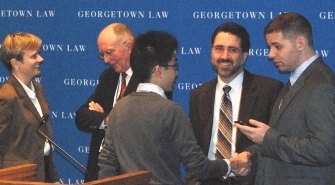
© 2010 Gay Military Signal